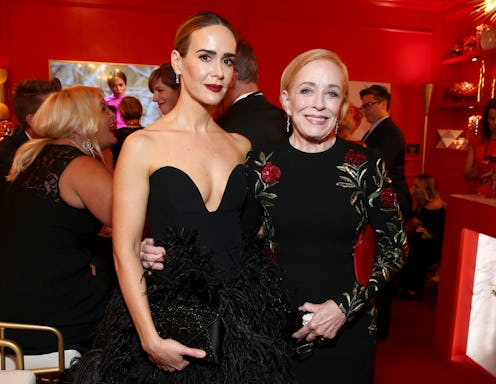(Living)
Is Age Really Nothing But A Number When It Comes To Romance? A Relationship Expert Sounds Off

No relationship is without its unique set of challenges, whether that means cultural differences, morals that don't always line up, trust issues, or any number of common problems that can effect whether or not the two of you can have long-term compatibility. For some couples, one thing that can be a major factor is age — particularly when there's a significant gap between them. And while no two May-December romance are created equally, it still begs the question: What is a good age difference in a relationship? According to therapists, the answer isn't so cut-and-dry.
Couples with large age gaps are not uncommon, and in fact, there are many examples in the spotlight. From Nick Jonas and Priyanka Chopra's 10-year divide to Sarah Paulson and Holland Taylor's 32-year difference, these types of unions may appear to be largely accepted, but they're still often scrutinized. So what's the big deal? Well, as relationship experts like psychologist Dr. Paulette Sherman (who's also authored Dating from the Inside Out and the upcoming Facebook Dating; from 1st Date to Soulmate) explain, there can be a lot of issues that are unique to those relationships and they could be potential red flags.
"Common issues that occur with age differences are that partners may have different interests, maturity levels, a different generation of friends and lifestyles, and there could be a potential power dynamic if one person is more successful or worldly," shares Dr. Sherman. That said, just as with the case of opposites attracting, there are characteristics of a much younger or older partner that not only makes them more desirable, but could actually help you be more compatible. "Some advantages [...] include the excitement of learning from one another and being complementary in terms of your gifts and needs, potentially reclaiming parts of yourself you’ve ignored," she adds.
Such advantages, Dr. Sherman explains, mean that in the best cases these relationships can experience a lot mutual admiration and fun — but often times it takes more to have a healthy, lasting connection. According to the expert, when the two of you are at opposing places in your life, big age differences might prove to be too much for you to be compatible in the long run.
For example, while 10 years might not seem like a huge difference, there are factors where it can put the two of you in very different head spaces. "Certain seasons of life can cause friction, such as if one person wants a child and the other already had kids or is past their childbearing years," she says. "An example could be a woman who is 45 and a man who is 35."
Besides the fertility/having kids factor, another instance of when age difference could cause serious friction is in terms of your career path. Dr. Sherman provides the example of a college aged person with a partner who's more established in their career — like a 21-year-old dating someone in their 40s. "They may not yet know what they want to do with their life and have less structure and stability, plus no income," she explains. This may not be a deal breaker in some relationships, but for someone looking for a mate on a similar path, it can be a struggle.
As one person in the relationship enters an age where health is increasingly worse — and the other is still relatively youthful and in good health — this may be another strain unique to couples with a big age gap. "If someone dates someone who is far more elderly, say [one] is 57 and [the other] is 75, she may need to contend with aches, pain, illness, lack of energy and different lifestyles in the future," Dr. Sherman points out. In these cases, the partner needs to be able to occasionally take on the role of caretaker. This requires a lot of patience and emotional maturity, which may not be as available in someone who's a lot younger and therefore less experienced in life.
All that said, dating someone significantly older or younger than you doesn't have to mean you don't have a bright future together. Dr. Sherman explains that if you are in this type of relationship and want to make it work, it will benefit the both of you to be aware of these potential issues down the line, and make sure it's something you are willing to face head-on. And as is the case with every good relationship, that means communication is key. "It’s important to understand the other person’s history and where they are coming from and not to assume that your way is the only right way, and to find places to compromise," she says. "Remember why you chose them in the first place and remember to appreciate those qualities."